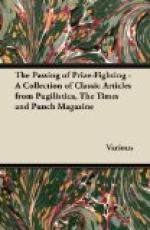To that he said “Yes, and No,” always, I think, a safe answer. True, he had his duty to perform, and right well he performed it, we agreed. But he had also his powers, his responsibilities—might we say, his scope? Yet, I gathered, there were things which, not being entirely master of himself and his affairs, he could not do. Take my own case, for example. I suggested (very cautiously) that it would require a very much greater authority than himself to give relief to an ordinary person like myself, with no stronger reason to travel by the civilian boat than that my whole financial future and domestic happiness depended upon my doing so. He said nothing to that; I gave him but a very little chance. I said that I knew quite well that he would help me if he could. We were unanimous as to the kindness of his heart. It was because I quite realized that he couldn’t that I didn’t ask him or think of asking him. Very soon after that we parted, I to sail for England—but not by the leave boat.
Alas! for the weakness of human nature. I am no stronger nor more able to be secretive than Robert, John and the rest of the brethren. I bragged; and now I’m told there is a printed order posted outside that M.L.O.’s office, making it a crime punishable with death for any officer proceeding on leave to converse or attempt to enter into conversation with the M.L.O.
The only other thing I have to mention to you, Charles, upon this subject, is the application of a very earnest young lieutenant, who, I’m sure, would always obey all rules and regulations, both in letter and spirit, with scrupulous regard. His application is worth setting out in full:—“I have the honour to apply for leave to the United Kingdom to get married from January 9th to January 18th inclusive.”
Yours ever,
HENRY.
* * * * *
[Illustration: “WONDER ‘OW THE NAVY’S GETTIN’ ON.”
“DUNNO. AIN’T SEEN ’EM ABOUT LATELY.”]
* * * * *
THREE AUGUSTS.
A WAR-TIME DRAMA.
ACT I.




